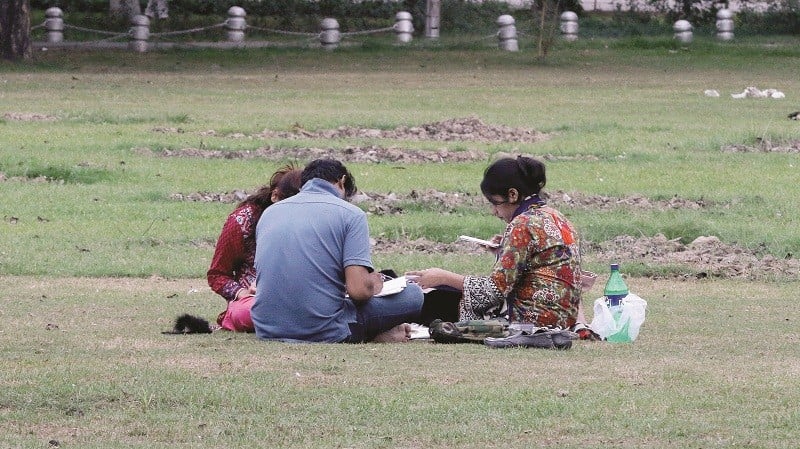
In statistics and emotions, brain drain contributes violently to the story of Lahore. A general perspective of young urban professionals…

Growing up in Lahore, I possessed a pitiful envy for those who were afforded the chance to escape the city. James Joyce recalls a similar feeling when he discusses his life in Dublin: he had to leave the city to find himself. He remembers in postcolonial Dublin a city that was trapped in the constancy of seeking and avoiding movement.
Movement outside of Lahore -- in a sibling studying abroad or that rich uncle who comes bearing gifts -- is treasured existence. Movement inside -- patriotically defended to attentive ears -- is often perceived to be remorsefully remembered. The Lahore that I grew up in was constituted of schools and tuition centres, kids and their parents. In confusions of youth, we talked a fair bit about airplanes and vacations. Conversations would list subways, vending machines, US credit cards and their corresponding online access, citizenship privileges, and all other similar insults to the otherwise expected stagnancy of living in Lahore. As children matured into teenagers, discussions of escape became less showy and more practical in the realm of college applications and summer camps. Movement outside, the kids of my elite educational institute realised, could be ambition.
Today, as I spend half my year in the States completing my undergraduate degree, I cannot wait to immediately come back to Lahore and begin working on all my big, small ideas. My elder brother (always known to be wiser) now often champions a cause contradictory to our opposing adolescent beliefs. After working in Lahore for around a year, he cannot wait to eventually leave.
In between the minds of migrants and residents, a city becomes a story before an objective reality. Brain drain, in statistics and emotions, contributes violently to the story of Lahore. From the perspective of the young urban professional, the decision at the onset of building your life is most important: so what do these grown-up kids have to say? I sought to answer this by asking recent graduates how working in Lahore felt.
Complaints from the professional environment of Lahore range largely from critiques of an unreliable, unaccommodating work ethic to disagreements with a dainty, rigid social environment. Saad (real names changed), who returned to Pakistan after studying in Germany, found himself in a scattered social position. The friends who had stayed in Lahore had moved on far too deep into circles of their own and the friends who left with him, who he liked, seldom ever came back.
For Saad, moving back was a bigger culture shock than moving abroad had ever been: "Working [in Lahore], people are a lot more laidback. That really annoys you if you’ve even done an internship abroad because your work ethic and your professionalism are completely different."
Others express a similar concern. Nabiha works at Pakistan’s finest, most authoritative news magazine, and reports a similar lethargy in terms of even simple administrative work. Ahmad laughingly notes down what he deems a "regular Lahori routine" of coming into work at 11am, waiting first for your lunch, and then getting down and dirty to really work. Saad aptly defines this attitude as the "seth culture" of Lahori urban professionalism.
A common sentiment shared across individuals involved in the education, marketing, journalism, and consultancy sectors is in the inappropriateness of traditional office ethics with evolving work techniques and acumen. For example, Ali works for an NGO that is involved in the educational development sector. The organisation helps write curriculum, scripts, and whatnot. "The experience is fine," he explains. "I just wish there was more work and less time required. As in, a 9 to 6 does not make any sense for the kind of job we’re doing; you can easily do that in much less time and do it much better.
"Emotionally, it’s draining because you think the way you’re working does not make sense."
In a consistently globalising world, dissatisfaction with your local work environment means an immediate consideration of working elsewhere. To those interviewed, the prospect of working abroad is definitely an active aspiration or desire. Often, however, these ambitions are hindered by a lack of opportunities: a Pakistani Bachelor’s degree holds little value in the global job market and to pursue a Master’s abroad is both a privilege and a leisure afforded by few.
Within this wavering pessimism and critique, however, remains a lot of astute productions of careers in Pakistan. It seems, additionally, that things were much different in 2018 than they were before. Saad believes firmly in the entrepreneurial spirit that Lahoris seem to be submerged in. Saba believes that "our media industry is booming right now and, in terms of public relations, [she] honestly wouldn’t know where to start if [she] shifted elsewhere."
She further contends that "despite all the payroll and ethical concerns among other problems of working in Pakistan, the youth seems to be comfortable here because everyone’s at the stage of learning, gaining experience, and making a name for themselves."
In that vain, those working here passionately seem to imagine nowhere else to serve them better in terms of personal joy within careerism.
The retention of educated Pakistani talent and perspective seems to be at an important balancing stage today. In the advent of global xenophobia, does the escaping Lahori really have a valuable, respectable escape? Or is that a myth of the past?
The air, as we all know, deteriorates around us daily. In coughing fits and dangerous scents, who would avoid an opportunity to breathe better? Are we perhaps in the moment of history where we are better off contributing to alleviation over elusion? I hope time will guide us.